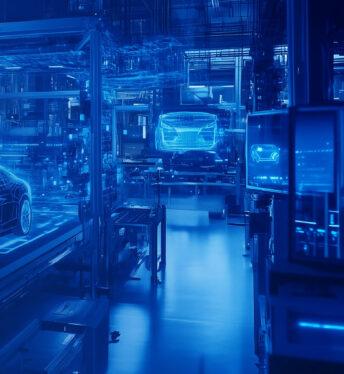It’s no secret that technology is having a profound impact on how factories operate today, with newfound tools and techniques making the manufacturing process highly digitalized, resulting in increased operational efficiencies. Indeed, the dawn of the smart factory is here. But what makes a factory smart and how does the manufacturing industry benefit from technology? Read on for the answer.
How can we make factories smarter? Click this link for tips and tricks!
What is a Smart Factory?
To create a smart factory, you need smart manufacturing. One of the most defining features of smart manufacturing involves its ability to harness the power of data. Indeed, smart manufacturing is all about big data, predictive analytics, and artificial intelligence. While early computers were certainly an advantage for the industry, seeing as they could do what humans do, but better and faster, smart manufacturing puts connected machines in the business of real decision-making through calculations outside the range of human abilities. In short, the data tells us what to do without human interaction.
In a smart factory system, machinery and equipment are able to improve processes through automation and self-optimization. According to Manufacturing Tomorrow, the benefits of these advancements extends beyond the physical production of goods and into actions like supply chain logistics, planning, and product development.
However, the core value of the smart factory still occurs within the four walls of the plant as the factory’s structure can include a combination of production, information, and communication technologies. The true advantage of this smart factory lies within the potential for integration across the entire manufacturing supply chain.
Through the Internet of Things (IoT) or other types of advanced integrated circuits (IC), all of these disparate parts of production can be connected. These links enable sensing, measurement, control, and communication of everything that’s happening throughout the manufacturing process.
Smart Factory Solutions
The smart factory is built around the technology that makes data processing possible, which includes intelligent sensors, motors, and robotics present on the production systems and assembly lines. Further, through technologies like digital twins, which are virtual replicas of physical devices, data scientists and IT pros can run simulations before actual devices are built and deployed.
Sensors assist with monitoring specific processes throughout the factory, which increase awareness about what’s happening on multiple levels. For instance, vibration sensing can provide a warning when motors, bearings, or other equipment need to be maintained. These subtle warnings become alerts for preventative maintenance or other actions that can help avoid larger production problems if left unattended.
Another example include sensing technology on self-driving vehicles that is used for material handling improves efficiency and safety as product is moved around the factory. These types of robotics have the ability to sense and evade people, as well as unexpected barriers, during the course of its work. The powerful advantages that arise thanks to the ability to automatically avoid these common disruptions keeps production running optimally.
What led to smart manufacturing? Learn more here!
Industry 4.0
Communication and the ability to use the data gathered is what makes a factory smart. A huge part of this technological revolution is the result of Industry 4.0 – also known as the next industrial revolution. This has given rise to machines, facilities, fleets, and networks and laid the groundwork for the industrial internet, which is made up of an interconnected network of industrial operations.
According to Wikipedia, Industry 4.0 is a project set into motion by the German government that promotes the computerization of traditional industries such as manufacturing. The resulting intelligent or smart factory is characterized by adaptability, ergonomic, and resource efficiency, as well as the integration of business partners or customers in business and value processes. The underlying technological foundation is made up of IoT and cyber-physical systems. These systems make great use of:
- Wireless connections, both during product assembly and long-distance interactions
- Last generation sensors that are distributed along the supply chain
- Elaboration of a great amount of data to control all phases of construction, distribution, and usage of a good.
Further, there are several benefits that arise from smart manufacturing. Some examples include:
- Advanced manufacturing processes and rapid prototyping allow each customer to order a unique product without significant cost increase
- Collaborative Virtual Factory (VF) platforms drastically reduce cost and time associated with new product design and engineering of the production process through exploiting complete simulation and virtual testing throughout the Product Lifecycle
- Advanced Human-Machine interaction (HMI) and augmented reality devices help increase safety in production plants and reduce physical demand to workers.
- Machine learning can help with production processes by reducing lead times and energy consumption
- Cyber-physical systems and machine-to-machine (M2M) communication helps with gathering and sharing real-time data from the shop floor in order to reduce down and idle times by conducting effective predictive maintenance
Ultimately, the application of intelligence at the factory level creates a dynamic production environment. The desired results – reduced costs and improved quality and reliability – then follow. Smart equipment makes it possible to automate much of what’s required to accommodate product variation and smaller-sized production runs during the manufacturing process. The future of manufacturing will likely lead to more customization; by minimizing downtime for retooling and resetting equipment, manufacturers can operate efficiently while staying flexible.
What kinds of solutions does Stefanini offer for Smart Manufacturing? Learn more here!
Smart Manufacturing with Stefanini
Smart factories today require more than robots and automation. Disruptive technologies like IoT transformed manufacturing for the modern industrial revolution. Now smart manufactures must capitalize on their IoT data for process insight and prescriptive analytics. At Stefanini, we’re on the forefront of these digital tools to ensure our clients are leveraging them for productivity and profitability.
We’re here to help, with the expertise and experience to provide new ideas and insights. We take a customer-first approach to everything we do, analyzing your pain points and business objectives to co-create a solution custom fit for you. Ready to bring your factory into the future? Give us a call today!



















